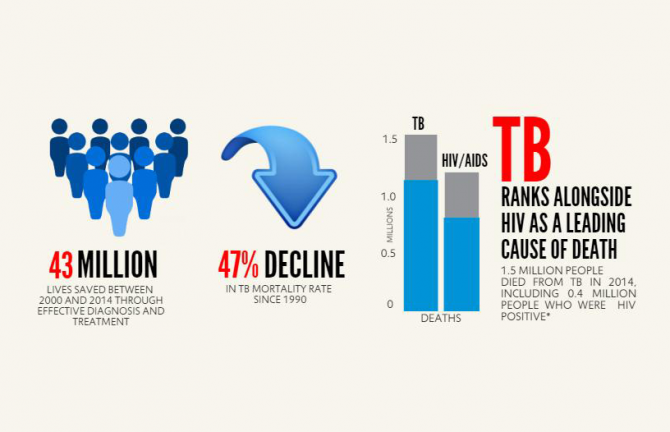

Feature Story
Dramatic fall in tuberculosis deaths, but disease still a leading killer worldwide
30 October 2015
30 October 2015 30 October 2015The global tuberculosis (TB) death rate has fallen by almost half since 1990, but more than 4000 people a day are still dying from this preventable disease, says the World Health Organization’s (WHO) Global tuberculosis report 2015, released on 28 October.
TB ranks alongside HIV as a leading cause of death, with 1.5 million people dying from the disease in 2014, 400 000 of whom were HIV-positive.
"The report shows that TB control has had a tremendous impact in terms of lives saved and patients cured. These advances are heartening, but if the world is to end this epidemic, it needs to scale up services and, critically, invest in research."
WHO Director-General Margaret Chan
There have been notable successes in the TB response and effective diagnosis and treatment have saved 43 million lives in the last 15 years. The TB target of Millennium Development Goal of halting and reversing TB incidence by 2015 was achieved both globally and in 16 of the 22 countries where 80% of cases occur.
According to WHO Director-General Margaret Chan, “The report shows that TB control has had a tremendous impact in terms of lives saved and patients cured.” She added a note of caution, however. “These advances are heartening, but if the world is to end this epidemic, it needs to scale up services and, critically, invest in research.”
As well as this increased investment, new diagnostics, vaccines and medicines must be developed and funding improved. The report argues that the main cause of gaps in detection and treatment is a significant funding shortfall, which in 2015 amounted to US$ 1.4 billion of the US$ 8 billion needed to implement TB programmes.
Funding is also critical to finance the ambitious move away from controlling the disease to ending the global TB epidemic, due to begin in 2016. WHO Member States have now adopted the End TB Strategy, which provides a road map for countries to reduce TB incidence by 80% and deaths by 90% by 2030, while also ensuring that families are not crippled by expenses owing to the disease.
“Ending the TB epidemic is now part of the Sustainable Development Goal agenda,” said Eric Goosby, the United Nations Secretary-General’s Special Envoy on Tuberculosis. “If we want to achieve it, we’ll need far more investment—at a level befitting such a global threat. We’ll also need progress on universal health coverage and poverty alleviation. We want the most vulnerable communities worldwide to gain first, not last, in our efforts.”



